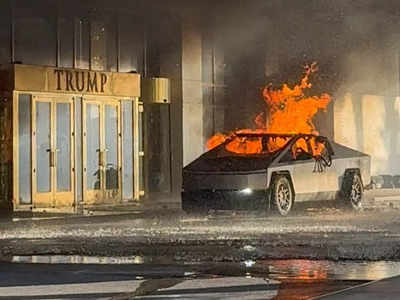A fiery explosion outside Trump International Hotel on New Year’s Day, involving a Cybertruck and a decorated Green Beret, has left behind a note that paints a complex portrait of a man battling inner demons while issuing a dire warning to the nation.
Matthew Livelsberger, 37, blew himself up in a rented Tesla Cybertruck outside the Las Vegas landmark, injuring seven bystanders and sparking immediate speculation over his motives. However, a handwritten note found on his iPhone sheds light on the incident, with Livelsberger emphatically stating: “This was not a terrorist attack. It was a wake-up call.”
The final note: A call to arms?
In his note, Livelsberger described the US as “terminally ill” and accused its leaders of enriching themselves at the nation’s expense. “Americans only pay attention to spectacles and violence,” he wrote. “What better way to get my point across than a stunt with fireworks and explosives?”
Directly addressing fellow service members and veterans, Livelsberger pleaded: “TIME TO WAKE UP! We are being led by weak and feckless leadership.” Despite the explosive location—outside a Trump-branded hotel—and the high-profile Cybertruck used in the act, Livelsberger expressed no animosity toward Trump, whom family members say he supported.
Behind the explosion: A troubled soldier’s last act
The FBI revealed Livelsberger was the sole fatality in the blast, which he orchestrated with chilling precision. Before igniting the vehicle, he inserted a handgun into his mouth and pulled the trigger, moments before the Cybertruck erupted. Law enforcement also dispelled conspiracy theories, confirming that the vehicle was not set to self-driving mode.
Livelsberger’s family told investigators that he was a “patriotic American” and a Trump supporter. Yet, his note points to deeper personal struggles, including PTSD, guilt from combat, and recent heartbreak. Reports surfaced that his second wife had left him days before the explosion.
An ex-girlfriend revealed he had suffered a traumatic brain injury during his service in Afghanistan, which led to memory loss, relationship challenges, and guilt over battlefield actions.
Symbolism or spectacle?
The choice of a Cybertruck—a symbol of Elon Musk’s tech revolution—and the Trump hotel fueled speculation of political undertones. Yet Livelsberger’s note muddies these waters, suggesting a broader frustration with American society and governance.
“This wasn’t just a cry for help,” a senior FBI official told reporters. “It was a deliberate, symbolic act aimed at sending a message to a divided nation.”
A nation divided
As investigations continue, Livelsberger’s actions have sparked debates on mental health among veterans, the state of American politics, and the desperate lengths to which some go to be heard.
While the explosion outside the glitzy Trump International Hotel may fade from headlines, the question remains: Was Livelsberger’s dramatic act a wake-up call—or just another moment lost in the noise of America’s spectacle-driven culture?




